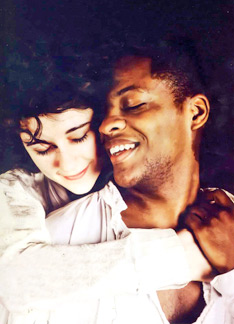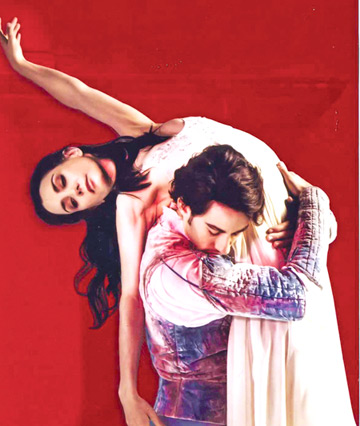|
Romeo and Juliet:
A classical ballet that may revolt the Bard
by Gwen Herat
At random I picked Romeo and Juliet as one classical ballet that
danced Shakespeare's play and not acted, nor dramatised or dialogued.
How and why people flock to see it still remains a mystery though the
poet wrote it for the stage with full concentration on his dialogue
power.
|

Shakespeare would have been annoyed if he had seen a black
Romeo. Here Elie Kendrick
and Adetomiwa Edun act as Romeo and Juliet. |
And have you ever wondered what Shakespeare would have gone through
when his plays were publicised without those magnificent dialogues that
he so lovingly put into the plays. Dialogue was his major intent,
passion and not so much his charters that were later immortalised.
We also know that Shakespeare was much more alive to the literature
of his time and did not concentrate on the theatre. He considered
himself a playwright rather than a poet which means his ‘words’ were his
lifeblood. Removing his dialogue in any form would kill him if he were
alive.
The question whether Shakespeare was an artiste and the invasion of
his plays by ballot is often discussed by both directors and
choreographers. Shakespeare was a prolific writer but it is doubtful
whether dance could relay the meaning of solid dialogues. The Bard would
be livid if some artistic form could eliminate his immortal ‘words'.
Yet, there were so many poets who dared to denounce him.
Literary judgement
We also know that literary judgment often rests on antithesis and his
works were not spared from this opinion. But he was the master of
himself that no one dared put him through the mill.
He gave regulating power to this thesis and split their elements only
to emerge unscathed. That was the signature of this glorious playwright.
The fragments of tragedies that often rest upon his plays, made
Shakespeare stand apart from the rest, even from the so-called
‘University Wits'.
In Romeo and Juliet, he manifested, even from the so-called
‘University Wits'. Love obey; how is the thread that binds hearts spin
is sometimes broken and there were no changes in feeling in this great
tragedy. He became a victim of his own deductions.
Is there a wider message implanted in the young lovers the world is
yet to discover. Was it a retaliation of his failed marriage with Anne
Hathaway with whom he failed to have a dialogue. He discovered his
emotion rustling among the forests of Arden, not finding a resting
place.
Philosophy
Less has been indicated about Shakespeare's philosophy because many
reflections on life appear in his plays that can be communicated only by
dialogue and these are the instances that ballet can never display.
The scattered fragments of his thoughts can be a body of doctrine the
way one look at it. They can yield answers differently to people. His
philosophy vanished the moment you grasp it. This is the difference in
makeup with the ‘University Wits’ of his time and himself that could
have embarrassed the Bard if someone pointed it out.
However, this deduction allowed the playwright to proceed beyond
earthly life which at times puzzles the reader. Shakespeare owns up to
the fact that human reason in Hamlet is limited compared to the
exuberance found in Romeo and Juliet and did no more than find rare
moments.
In his dialogues with singing birds among trembling leaves in the
dark of the night, the lark and nightingale respond. He urges his
characters to romance with flowers and kiss the parting wind. So how can
one put all these to action let alone adorn ballet.
|

Shakespeare would have been stunned if Romeo and Juliet were
staged
without his dialogue. |
Yet, it is still done and will go on. That is the depth found in his
‘words’ which the reader has locked inside his brain.
There is a scene I recall in Romeo and Juliet where he touches
Juliet's dress as though it was the Holy Sepulchre. The fleeting moment
tells us what dialogues can do.
Poignant moment
At times Shakespeare attempts two methods of handling a poignant
moment but or fails a version he had earlier envisaged but simply he
cannot fit into the story. But he is a crafty writer; he knows how to
twist and bend a character to suit his purpose.
In Romeo and Juliet he is face to face with textual problems in
duplicated speeches. Why had he put such ‘mature’ words upon Juliet's
lips when she was not yet 14.
In our minds, Shakespeare is a dramatist who conceives art in terms
of his rivals especially Christopher Marlowe. Equally and significantly
the wars of the theatre were of different companies and playwrights
wrote plays to establish an identity of their own. Skakespears cared
less for such irrational thinking but went about his own way of writing.
With regard to his textual problems, the earliest text of the play is
the First Quarto and the Second Quarto (Q1 and Q2) derive from the
actors’ recollections and they are largely from Shakespeare's own draft
and deemed by scholars that the playwright could not be troubled to work
on their details.
Romeo: ‘I would I were thy bird.
Juliet: Sweet so would I
‘Yet I should kill thee with much cherishing
Good night, good night. Parting is such sweet sorrow
Then I shall say good night till it be tomorrow. |

